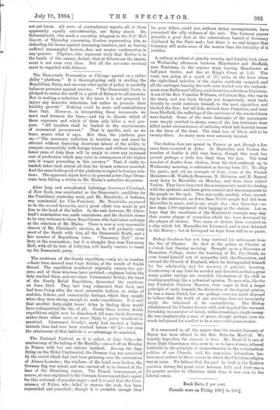The Democratic Convention at Chicago agreed on a rather shifty
" platform." It is thoroughgoing only in reviling the Republican Party, and on every other point of policy it carefully balances promises against reserves. " The Democratic Party is pledged to revise the tariff in a spirit of fairness to all interests. But in making a reduction in the taxes it is not prepared to injure any domestic industries, but rather to promote their healthy growth." Nothing could be more self-contradictory than that. However, in interpreting these documents we must read between the lines,—and try to discern which of them expresses and which of them only hides a real pur- pose. "All taxation shall be limited to the requirements of economical government." That is specific, and, as we hope, means what it says. But then, the platform goes on,—" The necessary reduction in taxation can and must be effected without depriving American labour of the ability to compete successfully with foreign labour, and without imposing lower rates of duty than will be ample to cover any increased cost of production which may exist in consequence of the higher rate of wages prevailing in this country." That, if really in- tended, takes back almost all that the former sentence asserted. And the same holds good of the platform in regard to foreign rela- tions. The apparent object here is to prevent a few Jingo Demo- crats from falling a victim to Mr. Blaine's seductive eloquence.


































 Previous page
Previous page